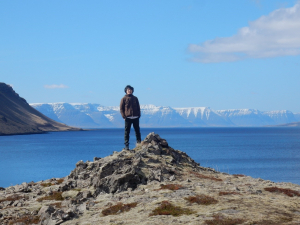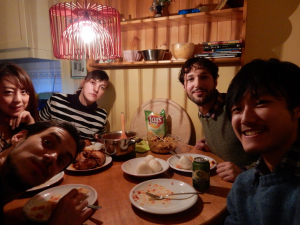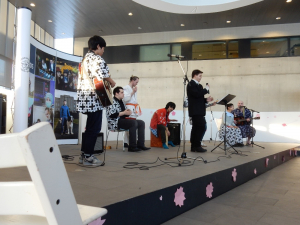I heard the name “Iceland” for the first time through music. One day, I accidentally came to know that Björk and Sigur Rós, my favorite artists, are from Iceland. Then I started to collect information about Iceland. Firstly, I became interested in Icelandic, especially its individuality. Icelandic is a unique language in terms of its conservative policy. Icelandic keeps its style from the Middle Ages and tries not to use loan words (This attitude is almost opposite to that of Japanese). Unfortunately, there are few texts about Icelandic written in Japanese and almost no Icelandic literature translated into Japanese, except for ones which were translated from another language and medieval literatures. Meanwhile, the information said that people in Iceland love literatures and own many books in their private library. Iceland has many literature works for its population. I study translation as a student of the Faculty of Letters, Arts and Sciences at the Waseda University, so Iceland looked to me as if it were a mine which has been never opened. Moreover, the more I learned about culture and life in Iceland, the more strongly I felt that it is important to study Icelandic and introduce Iceland to Japan.
For these nine months I was taking part in the Practical Diploma of Icelandic as a Second Language at the University of Iceland. It was a basic course but every class I attended was very instructive. The class “Pronunciation and Speech” was especially interesting to me because we studied Icelandic pronunciation mainly through conversation in the class so that we could learn useful, daily Icelandic words and phrases as well as rules of pronunciation. The class was also very hard to me. We had many assignments outside of school for the class. I went to bookstores, café, a shopping mall, a senior house and talk with people there in Icelandic. We prepared for the conversation in the class, but it was very difficult to understand what they were talking. Sometimes I could not understand anything and it tortured me, but at the same time, it was really interesting to talk with them because almost everyone who I talked with was very friendly and helped me to speak Icelandic and I could get many vivid information from that conversation. In the grammar class we sometimes submitted a short essay and teacher looked over and correct it very carefully. Every teacher did their best in class. I was surprised when teachers started to speak only Icelandic in class at the beginning of spring semester, but it helped me to get used to sound of Icelandic. My Icelandic friends were also very kind and helped me to study Icelandic. They taught me a shade of difference in Icelandic words and daily phrases. Sometimes I did the same thing to Icelandic students who study Japanese at the university. They were very eager students and impressed me.
I also had great local experiences outside of the university, for example, taking part in concerts as a drummer, communicating with local Japanese through volunteer work, and so on. I took part in the Japanese Festival held at University of Iceland and there I played some Japanese rock songs with my friends. I also took part in some local concerts with my friends. They became one of my best memories in Iceland. Teaching Japanese to children as a volunteer gave me good opportunity for reflecting on my mother language. As a volunteer work, I translated one picture book written in Icelandic into Japanese. People of that volunteer group gave me some useful information about life in Iceland and sometimes invited me to dinner. It was also wonderful that my friend introduced to me a writer who has written books for children which I would like to translate into Japanese.
Now I am back into Japan and I am sure that the feeling I had before going to Iceland was not wrong. Tokyo, where I live now, is everyday driving itself towards “wealth” and “development”. Is this really necessary? Tokyo is indeed advanced, convenient and rich, but people start to realize that it does not necessarily link to happiness. When I talk with my friends who work in Tokyo, I feel Japan is at the stage of reconsidering its way of life. According to the World Happiness Report 2016, Iceland took third place and Japan took 53rd. Iceland has many things we Japanese should learn in order to be happier. I believe translation plays an important role for that.
I currently have three aims: the first one is continuing to study translation and becoming a professional translator, the second one is returning to Iceland and taking part in the BA program to study Icelandic more deeply, the last one is making use of these experiences and translating Icelandic novels, plays, movies or music into Japanese to introduce Icelandic culture and its way of life to Japan. I would be very happy if I could translate Japanese into Icelandic one day. I know these are not easy aims, but I will continue my study in Japan and make money for my next study opportunity in Iceland.
Finally, I am very grateful to the Watanabe Trust Fund for giving me a chance to study in Iceland. I hope I could return the favor by being a bridge between Iceland and Japan in the future.
Shotaro Yamamoto
私が最初にアイスランドという名に触れたのは、音楽がきっかけでした。ある日、ふとしたことからビョークとシガー・ロスという敬愛するアーティストが共にアイスランド出身だと知り、そこからアイスランドという国について調べました。調べていく中で、何よりまず私の目を引いたのはアイスランド語の独自性です。中世から大きく形を変えることなく、外来語をなるべく排し、自国語の保存に努めてきた稀有な言語。そして、アイスランド語に関する日本語で書かれたテクストはほとんど存在せず、文芸作品に至っては重訳されたものを除くと皆無といってもいいほど…。にも関わらず、アイスランド国民は文学を好み、国民一人当たりの蔵書量は世界トップレベル、文学作品も人口に比して多いとされています。大学で翻訳を専門にしている私にとっては、まさに未発掘の鉱山のように映りました。また、それだけではなく、アイスランドの文化や生活について調べれば調べるほど、「アイスランド語を勉強し、アイスランドを日本に紹介できるようになることは重要だ」という直感を感じました。
そしてこの九か月間、実際にアイスランドで生活し、「外国人のためのアイスランド語学科」のディプロマーで勉強をすることができました。基礎に終始しはしましたが、どの授業も日本では受けられない、非常に有益なものでした。特に発音の授業は、会話をメインに進められたため、苦労はしたものの、発音のルールだけではなく日常で使える表現を学ぶことにも役立ちました。大学の外で会話をする、という課題が多く出たため、最初は大変苦労しましたが、会話自体の楽しさもあり、続くていくうちに力がついているのを実感できました。
また、友人とバンドを組んで大学やライブハウスのイベントに参加したり、現地で暮らしている日本人の方々とボランティアを通じて交流したりという現地ならではの体験もすることができました。日本語教育のボランティア活動は、母国語である日本語を見つめなおすよい機会になりました。ボランティアの一環として絵本の翻訳をしたこともよい経験になりました。また、友人の紹介で、いつか翻訳をしたいと考えている児童文学作家の方と実際に会えたことも、非常に有意義なことだったと思います。
今、留学を終え、日本に帰ってきて感じることは、先の直感は間違っていなかったということです。私が暮らす東京という街は、発展を目指して日々ものすごいスピードで回転しています。しかし、それは長い目で見たときに本当に必要なことなのでしょうか。東京は、確かに先進的で、便利で、豊かな街です。しかしそれが必ずしも幸福に結びつくとは限らないということに、人びとは気づき始めています。東京で働く友人たちと話して思うのは、日本人は生き方を見つめなおす段階にいるのではないかということです。最新の幸福度ランキングにおいて、アイスランドは3位、日本は53位となっています。日本の幸福度を上げるためにアイスランドから学ぶことは確実にあると私は考えます。翻訳は、そのための大切な手段のひとつだと私は信じます。
現在、私の目標は三つあります。ひとつは引き続き翻訳の勉強をして翻訳家として身を立てること。ひとつはもう一度アイスランドに行き、今度は三年間の学士のコースに参加し、より深くアイスランド語を学ぶこと。そして最後はそれらの経験を活かしてアイスランド語の文芸や戯曲、音楽や映画などの翻訳をし、アイスランドの文化や精神を日本に紹介することです。最終的には日本語からアイスランド語への翻訳にも携われたらこれ以上のことはありません。簡単な道ではないと思いますが、今のところは、日本でアイスランド語や翻訳の勉強を続けつつ、次のアイスランド留学のための資金を貯めたいと思います。
最後に、今回貴重な留学機会を与えてくださった渡辺信託基金に、心から御礼申し上げます。精進を重ね、いずれはアイスランド、日本両国にかかる橋のひとつとしてご恩に報いることができればと切に願っております。
山本翔太郎










